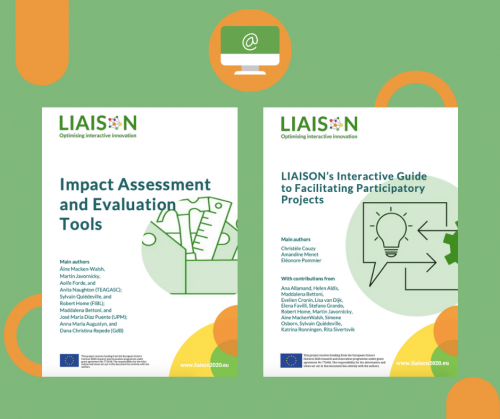On 13 April 2022 EU Horizon 2020 project LIAISON held a webinar on “Creating joint innovations in the agriculture, forestry, and food industries”. Bulgarian partners and external experts discussed the outcomes of the project and worked together to formulate a list of recommendations to ensure the successful implementation of the results in Bulgaria.
SHOWCASE was invited to participate in the webinar in light of the similarity of its goals to LIAISON, which ended in 2022. The webinar was co-hosted by the Bulgarian partners of the project from the Institute of Philosophy and Sociology at the Bulgarian Academy of Science and Sofia University St. Kliment Ohridski.
The LIAISON project, coordinated by Prof. Dr. Anna Maria Häring and Dr. Susanne von Münchhausen at the Eberswalde University for Sustainable Development (HNEE), is a research and innovation project that has been working to unlock the potential of collaborative working for innovation in agriculture, forestry and rural business in the past four years with a consortium of 17 organisations in 15 countries. The project’s main objectives are to create practical guidelines for farmers and foresters to continue meeting the expectations of wider society, whilst at the same time running their own successful businesses and working in harmony with the essential natural resources on which we all depend. The project also aims to foster cooperation and interactive innovations among all partnering organisations as well as relevant stakeholders and to contribute to smooth project coordination and fruitful exchange.
LIAISON results are based on 32 analysed cases of interactive innovation that are compiled in 5 guides, each of them detailing the specific needs of partners, recommendations for practitioners, advice for leadership decisions and management, as well as possible challenges to successful implementation.
The first guide focuses on the beginning stage of a project, helping to conceptualise the ideas into a coherent framework, funding procedures, and the importance of creating a plan for monitoring and assessment at this early stage.
The second guide centres on practices of good planning in relation to leadership, roles of participants, and way to proceed if change in leadership is deemed appropriate during a project’s duration.
The third guide outlines practices for establishing strong partnerships and more specifically, the communication, coordination, and cooperation between participants as well as the central role of trust in leadership that can ensure successful co-creation.
The fourth guide entails recommendations for successful stakeholder engagement. This guide details the importance of involving entities that are on the margins of the project as they can provide constructive feedback and open dialogue for change if necessary.
The fifth and last guide delineates ways to devise a strategy for measuring and assessing success of a certain tool or instrument and stresses its importance in ensuring project results have the potential to be implemented and/or upscaled.
These results are useful for SHOWCASE, which centres on achieving the European goal of sustainable agricultural production through the creation of a bridge of knowledge between incentives of agricultural producers and biodiversity management practices. Similarly to LIAISON, SHOWCASE aims to deliver new insight and innovative tools facilitating the agricultural sector’s transition towards more sustainable farming, and thus help meet wider societal needs.
Through the recognition of LIAISON project’s results, SHOWCASE can further advance its knowledge about biodiversity-agricultural production synergies and trade-offs. The latter can also benefit from the former’s detailed guides about successful science-policy translation. Alternatively, considering SHOWCASE has just entered the active stage of its research, it can learn from LIAISON project’s results and incorporate them into its research framework. Furthermore, LIAISON can inspire stakeholders and the general public to embrace the benefits of sustainable agricultural production in light of its common goal with SHOWCASE - biodiversity conservation.
Photo: Covers of two of LIAISON's guides.
